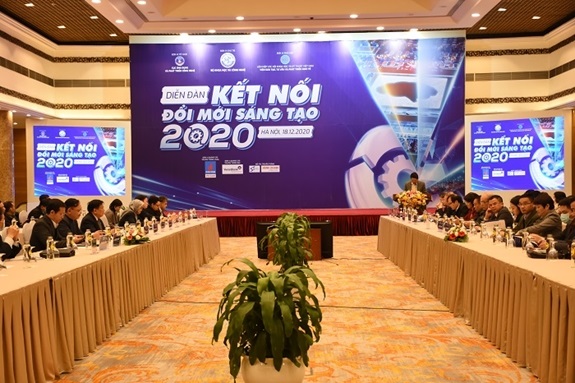
Innovation Connecting Forum 2020 – group photo ( photo by VISTIP)
According to one survey on jobs conducted by the World Economic Forum (WEF) shown that the 4th Industrial Revolution will create new types of jobs that requires skills and change the way of people's working. New technologies are bringing about an unprecedented change, it is estimated that 50% of the knowledge that a student acquires during the first year of his engineering degree will be obsolete by the graduation time of that student.
The task of education, especially higher education, is how to train human resources capable of absorbing new technology in order to adapt to the rapid transformation of society. In the history of development, the world's major universities have always adapted to the socio-economic contexts, and in many cases they have led to the development of industrial revolutions.
Before the 21st century, universities in general actively carry out the function of imparting knowledge, fostering talents and training specialists; research and develop new technologies and commercialize knowledge through the transfer of inventions to companies, enterprises, and manufacturers. However, universities have not really participated to the value chain. the out put products of universities will be transferred to society mainly in the form of semi-finished products.
Therefore, from selectively absorbing innovation experiences from universities around the world, innovation must be urgent for all Vietnamese universities, especially for engineering and technology higher education institutions to be adaptable in the era of the 4th industrial revolution. First, higher education institutions must be the place to meet the expectations of students: trainning the good students who meet the expectations of the job market and obviously high quality human resources in the future. They will have to not only understand the area of expertise but also have to transition from teaching and doing homework to project based learning.
Regarding the university model: In the face of the strong impact of the 4th Industrial Revolution, the university model is gradually changing from the university model specializing in training with the goal of training engineers and bachelors, skill workers become the Innovation and Creation Center that aim to create value in universities.
This is an important trend in the development of world higher education, known as higher education model 4.0 (Education 4.0) or innovative university model. Upon this model, the development of universities will be able to have a more direct and strong impact on the community and society; Proactive management, application and direct commercialization of intellectual property effectively right on university campus at the same time will help universities create economic value, financial autonomy, and reduce dependence on funding from government and other stakeholders.
Currently, there are many emerging technologies, typical technologies from the 4th industrial revolution such as AI (artificial intelligence); block chain technology; big data; machine deep learning; IOT (Internet of Things), BIOT (Big Data-based Internet) and mass of other technology solutions; especially the digital transformation of the economy.
The big question is whether the outputs of universities (the trained human resources at university level) are capable of solving existing problems from digital transformation, import, transfer technology in Vietnam or not? This is a big question that requires an overall solution. In that context, the training to improve the quality of human resources is the key to forster the ability to transfer and absorb technology.
According to a summary of evaluation from some research projects of Pro.PhD Pham Thanh Huy, to achieve this goal, the country's development strategy should have innovative solutions at specific universities such as:
1. To improve the quality of university and post-graduate education and training;
2. To create reasonable and synchronous mechanisms and policies to attract and use high-quality human resources;
3. To invest in further promoting technology transfer, research activities in universities, especially research-oriented universities and innovation-oriented universities;
4. Formulating policies to encourage scientific research, technology transfer and innovation in universities;
5. Enhancing the capacity to absorb and master technological solutions in enterprises;
6. To support the mastery and application of technology, commercialization of research results, intellectual property, and technology innovation projects in enterprises where students from higher education institutions will come to work.